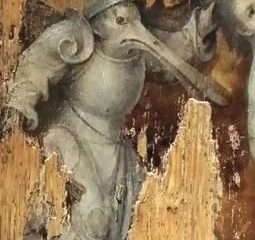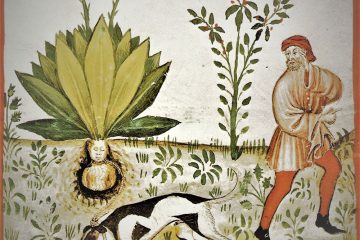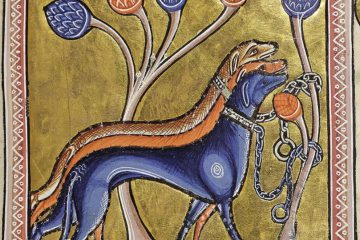Document (PDF)
The research network ZOOMATHIA is organizing in Montpellier with the laboratory CRISES and in association with ANIMED network from October 19 to 21, 2023 an International Conference dedicated to animal names
This conference focuses on several linguistic and pragmatic uses of zoonyms and the real animals that motivate them: those that have multiple names (polyonymy) and those that do not; those that share their names with other animals; those that give their names to (or receive them from) humans, places, diseases, or other objects in the world; those that change their names (metonomasia) and natures over time or by switching to another language; those that receive a naturalistic existence based solely on a name (« paper animals »)…
This conference aims to explore not only the tradition proper to Antiquity, but also its reception in the Middle Ages, how new ways of naming animals appear. The languages concerned are all those of the cultures of classical antiquity (Greek, Latin, Egyptian languages, West Semitic languages). For the Middle Ages, zoonyms in Persian, Arabic, Slavic languages and vernacular languages (French, Italian…) will also be addressed… Between all these languages, the questions of translation specific to zoological literature are particularly interesting to consider.
Our aim is indeed to « grasp the animal by its names », through lexical, etymological and onomatopoeic questions, showing phenomena of derivation or metaphor. We will also try to see what zoonymy reveals about the conceptions of the world, notably through the links between zoonyms and toponyms (epichoric zoonyms, zoophoric toponyms). In addition to these zoonymic questions and issues, there is place to address issues related to zoo-onomastics and focus on « proper names » given to individual animals, such as horses, dogs, and oxen, both in Antiquity and the Middle Ages.
The glossary of animal names constitutes the pivot of zoological knowledge and ensures the continuity of zoological data, even if this tradition is uneven and full of misunderstandings (or facetiousness), like all transmissions. The identification of animals through (or sometimes in spite of) their names, and the inter-linguistic correspondence that can be established, through translations, bilingual lexicons or borrowings, constitute an major dimension of the topic of this conference, but the zoological, referential or translation aspects are not the only issues of this meeting.
The zoonymic terminology also plays a crucial and dynamic role at the heart of the lexical and intellectual construction of ancient societies. Zoonyms operate links between different spheres of the socio-cultural structure, which go far beyond the totemic prism, and build micro-systems or elements of discourse whose effectiveness is based on a constant work of motivation and re-motivation.
The suggested approaches are therefore multiple and encourage the communication of linguistic, historical, translational, and anthropological approaches. Either case studies or more methodological approaches to animal onomastics and the human manipulations to which it gives rise may be proposed.
Proposals for papers (500 words maximum) by experienced researchers or young scholars should be sent before April 15, 2023 to the following addresses:zoomathia@cepam.cnrs.fr.,arnaud.zucker@univ-cotedazur.fr and chrchandezon@yahoo.com. They can be formulated in the traditional languages of the Zoomathia network: French, English, German, Italian or Spanish. The scientific committee will communicate its answers on June 01, 2022.
Organizing Committee: Christophe Chandezon (Université Paul-Valéry/Montpellier III), Arnaud Zucker (Université Côte d’Azur, Nice)
Scientific Committee: Sébastien Barbara, Christophe Chandezon, Jérémy Clément, Diego De Brasi, Isabelle Draelants, Cristiana Franco, Oliver Hellmann, Stavros Lazaris, Sian Lewis, Philippe Monbrun, Jean Trinquier, Marco Vespa, Arnaud Zucker.
Noms d’une bête ! L’usage linguistique et culturel des noms d’animaux dans l’Antiquité et le Moyen Age
Ce colloque s’intéresse à plusieurs usages linguistiques et pragmatiques des zoonymes et aux animaux vrais qui les motivent : ceux qui ont plusieurs noms (polyonymie) et ceux qui n’en ont pas, ceux qui partagent leur nom avec d’autres animaux, ceux qui donnent leur nom à des hommes, des lieux, des maladies ou d’autres objets du monde (ou le reçoivent d’eux), ceux qui changent de nom (métonomasie) et de nature dans le temps ou en passant à une autre langue, ceux qui se construisent une existence naturaliste sur la seule base d’un nom (“animaux de papier”)…
Il s’agira d’explorer non seulement la tradition propre à l’Antiquité, mais aussi sa réception au Moyen Âge, et la façon dont se fabriquent alors aussi des nouvelles façons de nommer les animaux. Les langues concernées sont toutes celles des cultures de l’Antiquité classique (grec, latin, langues de l’Égypte, langues ouest-sémitiques). Pour le Moyen Age, on abordera aussi les zoonymes en persan, en arabe, dans les langues slaves et également les langues vernaculaires (français, italien…)… Entre toutes ces langues, les questions de traduction propres à la littérature zoologique sont particulièrement intéressantes à envisager.
Il s’agira donc de « saisir l’animal par ses noms », à travers des questions étymologiques, onomatopéiques, manifestant des phénomènes de dérivation ou de métaphores. On s’efforcera aussi de voir ce que la zoonymie révèle des conceptions du monde, notamment quand à travers les liens entre zoonymes et toponymes (zoonymes épichoriques, toponymes zoophores). A côté de ces questions et enjeux zoonymiques, on pourra aborder des dossiers relevant de la zoo-onomastique et s’attacher aux « noms propres » donnés à des individus animaux, comme cela peut se faire pour des chevaux, des chiens, des bœufs, aussi bien dans l’Antiquité qu’au Moyen Âge.
Le lexique animal constitue le pivot des connaissances zoologiques et assure la continuité des données du savoir, même si cette tradition est accidentée et semée de malentendus (ou de facéties), comme toutes les transmissions. L’identification des animaux à travers (ou parfois malgré) leur nom, et la correspondance inter-linguistique que l’on peut établir, à travers les traductions, les lexiques bilingues ou les emprunts, constituent une dimension importante de la thématique de ce colloque, mais les aspects zoologiques, référentiels ou de traduction ne sont pas l’unique enjeu de cette rencontre.
Le répertoire zoonymique joue aussi, plus largement (comme le répertoire phytonymique) un rôle crucial et dynamique au cœur de la construction lexico-idéelle des sociétés anciennes. Les zoonymes opèrent des liens entre différentes sphères de la structure socio-culturelle, qui vont bien au-delà du prisme totémique, et construisent des micro-systèmes ou des éléments de discours dont l’efficacité s’appuie sur un constant travail de motivation et de remotivation.
Les approches suggérées sont donc multiples et doivent permettre de faire communiquer des recherche linguistiques, historiques, traductologiques, anthropologiques… On pourra proposer soit des études de cas, soit des approches plus méthodologiques sur l’onomastique animale et les manipulations humaines auxquelles elle donne lieu.
Les propositions de communication (500 mots maximum) par des chercheurs confirmés ou des jeunes chercheurs, sont à envoyer avant le 15 avril 2023 aux adresses suivantes : arnaud.zucker@univ-cotedazur.fr ou chrchandezon@yahoo.com. Elles pourront être formulées dans les langues traditionnelles du réseau Zoomathia : en français, anglais, allemand, italien ou espagnol. Le comité scientifique communiquera ses réponses le 01 juin 2022.
Comité d’organisation : Christophe Chandezon (Université Paul-Valéry/Montpellier III), Arnaud Zucker (Université Côte d’Azur, Nice)
Comité scientifique : Sébastien Barbara, Christophe Chandezon, Jérémy Clément, Diego De Brasi, Isabelle Draelants, Cristiana Franco, Oliver Hellmann, Stavros Lazaris, Sian Lewis, Philippe Monbrun, Jean Trinquier, Marco Vespa,Arnaud Zucker
Conférencier(e)s invité(e)s : Elisabetta Carpitelli (Université Grenoble Alpes) & autre conférencier à confirmer


